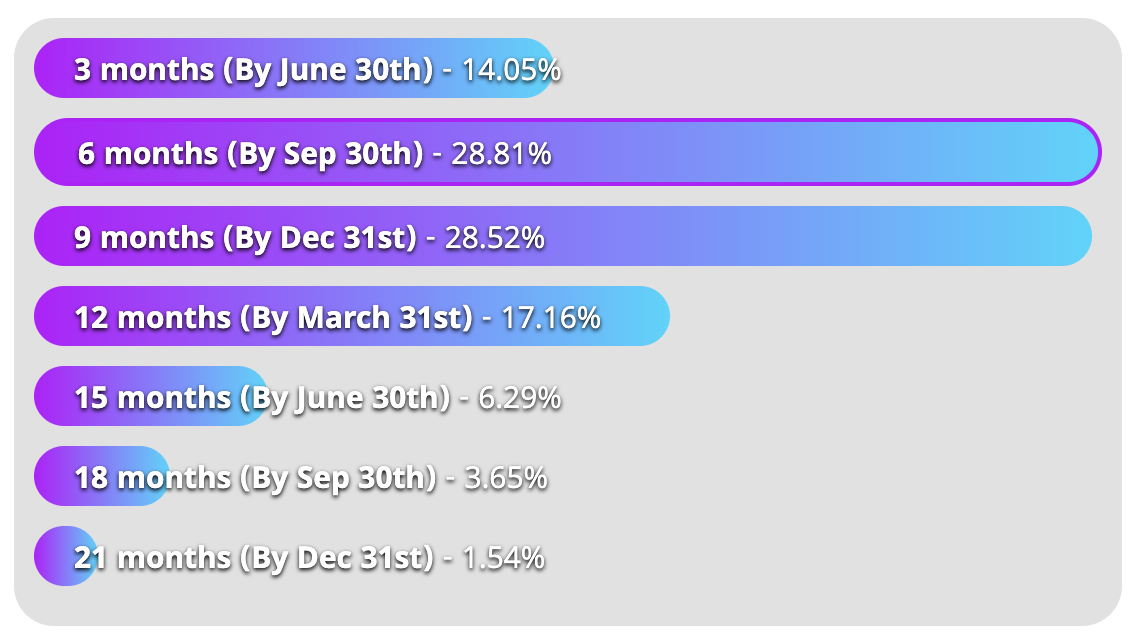What is the earliest date by which the FDA will approve the first COVID-19 Vaccine?
Three days ago, I asked our community to predict when the FDA would approve the first vaccine.
Using the FutureLoop platform, which combines both machine learning (ML) and human intelligence (HI) in a symbiotic loop, we aggregated predictions from nearly 3,000 participants with some fascinating results, presented below!
>>> If you haven’t participated in the prediction poll yet, please go here.
>>> To vote on the next prediction topic, please go here.
Also, at the end of this blog, see the evidence to support crowdsourcing predictions.
(Note: If you like this blog, share it! | Facebook | Twitter | LinkedIn | Or send your friends and family to this link to subscribe!)
What did the crowd say?
In a mass show of optimism, the community predicted a vaccine approval date only 8.64 months from now—or by December 19th, 2020 (the week before Christmas)—which would give us all something to be truly thankful about!
As FutureLoop allows participants (predictors) to give anonymized reasons for their predictions, here are a few of the most-upvoted optimistic reasons for fast approval:
- Critical situations require faster-than-usual approval processes
- Economic pressure and multitude of vaccine tests
- FDA is removing the usual barriers
The more pessimistic participants (predictors) have upvoted the following as their primary reasons for being pessimistic:
- Even [if] fast-tracked, it must be tested sufficiently
- [Need] enough time for R&D and human testing
- Normally takes 18+ months
Here are the results:

In addition to this data, FutureLoop’s Prediction page allows you to see the overall results presented graphically by: age; gender; primary industry; and work title.
What Prediction Poll should we do next?
Every week, we ask FutureLoop participants to suggest polling questions, and we’d love your vote on which poll we should run next. What are you most curious to find out?
Below are the top 5 candidates. To vote on your favorite, click here!
- On what date will the Dow hit its lowest point (between now & Dec 31, 2020)?
- What will be the lowest point reached on the DOW Jones index between now & Dec 31, 2020?
- When will the U.S. hit peak COVID-19 deaths per day?
- How many people will die from COVID-19 by Dec 31, 2020?
- What will be the highest unemployment rate reached during 2020?
But why should I listen to the crowd?
The use of Artificial Intelligence to generate crowdsourced predictions is maybe the most overlooked, deceptively growing and MONUMENTAL opportunity of the next decade….
It’s a process by which a large enough group of sufficiently knowledgeable people are able to make a reasonably accurate prediction on a future outcome.
Whether in predicting election outcomes, economic trends, sports results, or even terrorist activity, crowdsourced wisdom has time and again matched or (often) outperformed expert predictions.
Starting in the early 2010s, a project sponsored by the U.S. Director of National Intelligence — the Good Judgment Project — demonstrated that 3,000 moderately informed minds could together outperform even the top foreign policy experts or CIA analysts.
According to one report, when ‘super-predictors’ (crowdsourced individuals who are correct most often) are grouped in teams, these smaller ‘crowds’ can outperform agents with access to classified information by up to 30 percent.
By anonymizing and aggregating thousands, or even millions of user-submitted predictions and justifications, FutureLoop presents these analyses to users, allowing you to question the analysis, and then update your own estimate whenever you change your mind.
Users can also vote on the reasons provided by other users for their predictions (a crowd-filtering layer that helps us understand why people lean the way they do).
These upvoted predictions and reasons, in turn, get put at the top of the heap, alerting all users of the latest crowdsourced opinions.
To join the Crowd Prediction Poll, click here!
Join the Loop
Join FutureLoop: Over the past 2 years, I’ve built a machine-learning algorithm that scrapes the world’s news, science journals and social feeds every day to understand how exponential technologies are impacting specific topics & industries. It’s called FutureLoop. I was getting ready to share it publicly, but the current crisis has changed my plans.
Last week, I launched "FutureLoop Pandemic Special Edition," a daily comprehensive update on the impact of exponential technologies (Artificial Intelligence, Robotics, Drones, Cellular Medicine, CRISPR, Networks & Sensors) on the COVID-19 pandemic.
If you participate, FutureLoop will update you every day on the latest breakthroughs in detection, prevention & cure of the COVID-19. This product is still in Beta, but it’s powerful, high-quality info, and it's free.
Your mindset is your most important tool during this pandemic. Making sure you are consuming the right information is critical to maintaining that mindset. FutureLoop offers "Data-Driven Optimism."
You can subscribe here. It’s free, fun + fast (20 seconds).
(Note: If you like this blog, share it! | Facebook | Twitter | LinkedIn | Or send your friends and family to this link to subscribe!)
Abundance Insider: March 29th, 2020


